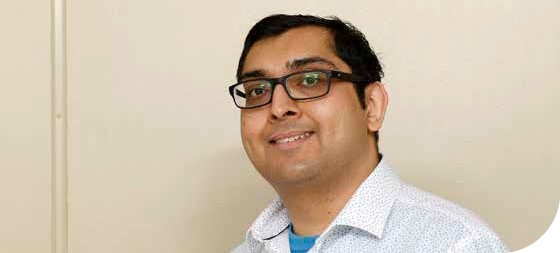I think that most people who pursue pathology as a career must be detectives at heart. We enjoy the hunt for the answer, ‘why is this person sick?’ There is so much satisfaction in finding the answer and knowing that now they can be helped.
Dr. Farhan Khan joined the Pathology Department’s five-year residency training program after transferring from Dalhousie’s family medicine residency training. He received his MD from Dalhousie in 2016, after receiving a BSc and MSc in microbiology and immunology, also from Dal.
“In family medicine, I realized how much I enjoy the diagnostic process,” he says.
That’s why Dr. Khan chose medical microbiology, a field in which pathologists work directly with patients in infectious diseases clinics. “These are often complex cases where we meet with the patient for an hour,” he says. “This provides an opportunity for a deeper relationship with them.”
Most areas of pathology do not involve direct patient contact but play a vital role in patient health and wellbeing by providing attending physicians with crucial information.
“In one patient thought to have metastatic pancreatic cancer, we discovered it was not actually cancer… it was tuberculosis that had invaded his pancreas and gut,” recounts Dr. Khan. “This finding dramatically changes his medical management and relieves him of that death sentence.”
As a resident in Medical Microbiology, Dr. Khan does rotations in bacteriology, mycology, virology, parasitology, infection control, public health, and antimicrobial stewardship, among others.
“We are trying to narrow the field of possible antibiotic prescriptions to those that will truly work for that patient,” explains Dr. Khan of the antimicrobial stewardship rotation. “We culture patient specimens and then test various antibiotics to see which work the best for this particular infection in this particular patient, and then advise the attending physician. The goal is twofold: to effectively treat the patient, while minimizing the chances of them developing an antibiotic-resistant infection by taking antibiotics that don’t work.”
A typical day for Dr. Khan and his Medical Microbiology resident colleagues begins with day call responsibilities at 8 a.m. “It is a great opportunity to learn the impact our work has on patient care,” he says. “We receive questions from physicians about lab results and, through our conversations, we help them interpret the results in their patient’s context and assist them in diagnosing and treating their patient.”
Twice a day, the pathology residents do rounds through the Microbiology Lab. Residents also attend specialty clinics and academic teaching sessions to round out their knowledge and experience. In third year, they do a longitudinal infectious diseases clinic once a week. “We see a lot of patients with rare infections,” notes Dr. Khan. “It is both intensely interesting and deeply satisfying to solve these mysteries and help patients get better.”

